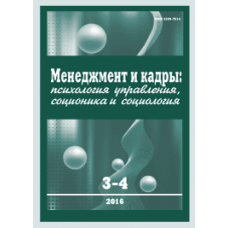Номер № 3-4/2016 журналу «Менеджмент і кадри: психологія управління, соціоніка та соціологія»
Memoria
Юрій Іванович Саєнко
Соціологія
Саєнко Ю.І.
Проблема вибору
Розглянуто процеси та проблеми вибору та прийняття рішень у соціальних системах. Описано фактори стабільності та нестабільності у процедурах вибору, взаємозалежність та взаємовплив суспільних сфер, індивідуального та кооперативного. Проаналізовано мотивацію соціальної поведінки та вибору з урахуванням «піраміди потреб» А.Маслоу. Описано феномен цивілізаційного вибору сучасного суспільства.
Ключові слова: соціальна система, суспільство, національний потенціал, вибір рішення, фактори потенціалу, біфуркація, майбутнє людства, еволюція цивілізації.
Нові технології
Качин С.В.
Застосування знань соціоніки при підборі персоналу та формуванні команди Мета статті звернути увагу на вибір професії, а також на вибір співробітника та формування команди як для конкретного завдання, так і на довгострокову перспективу. Стаття написана на основі матеріалів різних дослідників у галузі соціоніки, співробітників діючих рекрутингових агенцій, психологів та особистого спілкування з керівниками різних державних, комерційних підприємств та структур.
Ключові слова: соціоніка, тип інформаційного метаболізму, клуб управлінців, аристократи, формування команди. Інструменти менеджменту
Валенцова К.А.
Застосування діагональних імперативів в управлінні персоналом
Розглядається застосування в кадровому менеджменті одного з дивовижних методів соціоніки — діагональних імперативів. Описано рішення кількох актуальних завдань управління персоналом з прикладу однієї з російських компаній. Стаття може бути корисна соціонікам-початківцям, а також працівникам сфери кадрового менеджменту для доповнення своїх методів більш точними та глибокими інструментами соціоніки.
Ключові слова: соціоніка, діагональний імператив, аспекти інформаційного потоку.
Соломко Л.Р.
Новий погляд на попередній контроль у менеджменті
Розглянуто основні види контролю у сучасному менеджменті. Показано, що контроль у галузі людських ресурсів досягається за рахунок аналізу необхідних ділових та професійних знань та навичок. Показано переваги соціонічного аналізу, що дозволяє зробити «знімок» морально-психологічного стану колективу та оцінити ефективність взаємодії співробітників. Показано, що соціальний аналіз пропонує керівникам не розрізнені поради на рівні здорового глузду, а цілісну технологію роботи з людьми з урахуванням їхньої мотивації.
Ключові слова: менеджмент, мотивація, персонал, контроль, соціоніка, взаємодія співробітників, технологія роботи з людьми.
Методи соціоніки
Букалов А.В.
Порівняння соціоніки та інших типологій
Проведено порівняння соціоніки як науки та технології з типологією Майєрс-Бріггс та теорією Кейрсі. Показано, що, незважаючи на загальне з цими типологіями походження з типології К. Юнга, соціоніка, на відміну від них, дозволяє дати цілісну картину структури з психічних функцій, опис та прогноз інтертипних відносин у малих та великих групах. У практичній галузі соціоніка дозволяє формувати команди та колективи будь-якої складності, а також усувати конфлікти. Використання інформаційного підходу дозволяє застосовувати методи соціоніки в маркетингу, рекламі, соціологічних та політологічних дослідженнях. колектив, реклама, маркетинг.
Рейнін Г.Р.
Класифікація соціонічних малих груп
Розглядається типологія та класифікація соціонічних малих груп з погляду біполярних ознак. Наведено всі можливі розбиття соціону на четвірки парами ортогональних ознак та виділено два класи малих груп — однорідні та неоднорідні.
Ключові слова: соціоніка, типологія, біполярні ознаки, інтертипні відносини, малі групи.
Шнайдер А.
Специфіка роботи інтуїції можливостей у ЛСМ
Розкривається специфіка інтуїції можливостей як точки найменшого опору у логіко-сенсорного інтроверта Розглянуто її взаємодію Космосу з іншими функціями у межах роботи блоків, надано рекомендації щодо виходу зі складних станів. Описано особливості її прояву у міжстатевих відносинах представників даного типу.
Ключові слова: соціоніка, тип інформаційного метаболізму, модель А, точка найменшого опору, інтуїція можливостей.
Литвиненко І .Ю.
Связі між функціями в моделі А
Запропоновано поняття каузальних та акаузальних зв'язків між функціями інформаційного метаболізму в моделі А. Розглянуто особливості елементарного акту обробки інформації, в якому беруть участь 4 функції.
Ключові слова: соціоніка, психологія особистості, модель психіки, тип інформаційного метаболізму, функція інформаційного метаболізму.
Піменова Л.В.
Типні особливості мислення
Розглядаються стилі мислення та цикли розумових операцій, характерні для різних типів інформаційного метаболізму.
Ключові слова: соціоніка, психологічний тип, тип інформаційного метаболізму, мислення, поведінка, інформаційна структура психіки.
Питання освіти
Мегедь В.В.
Поетапне формування дитині
З позицій соціоніки та моделі інформаційного метаболізму розглянуто різні етапи формування особистості дитини. Надано рекомендації вихователям та педагогам.
Ключові слова: соціоніка, соціонічний тип, виховання, педагогіка, особистість, психологічні ознаки, періоди розвитку психіки, квадральні періоди.
Менеджмент і кадри 3-4/2016
- Модель: выпуск журнала «Менеджмент и кадры…»
-
$3.00
- Ціна в бонусних бали: 30
Рекомендовані товари
Менеджмент і кадри 5-6/2016
Номер № 5-6/2016 журналу «Менеджмент і кадри: психологія управління, соціоніка та соціологія&r..
$3.00


